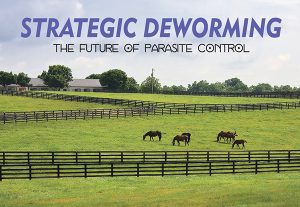Strategic Deworming: The Future of Parasite Control
For half a century, horsemen have been told to deworm their horses every two months. It’s a routine that most horse people follow, without much thought other than to rotate the type of dewormer that’s being used. Unfortunately, parasites haven’t been so lax over the years. They’ve been busy adapting to the chemical onslaught of indiscriminant deworming. It has reached a critical point where the dewormers you’re using may be ineffective. You’re squirting money down the drain and not protecting your horse’s health. You may, in fact, unknowingly be contributing to a monster problem for your horse and all horses in general.
The rise of parasitic resistance to anthelmintic medication, aka dewormers, is becoming widespread among all parasite types and with all drug classes. Even with most vets being on board with a “less is more” approach, product labels and horsemen’s habits haven’t changed in the face of growing volumes of research.
Recognizing this disparity, the American Association of Equine Practitioners (AAEP) formed a task force to develop a comprehensive set of recommendations and improved strategies for veterinarians. The conclusion of the report is that frequent deworming treatments aren’t needed to keep adult horses healthy. Instead, properly timed strategic treatments will keep horses healthier and slow the progress of drug resistance. Many horses only require one or two treatments a year. That said, the report includes the caveat that the guidelines are suggestions. The authors stress, “Ultimately, each farm (with veterinary guidance) should develop its own program tailored to the specific needs of the farm and each animal. There is no such thing as a one size fits all program.”
Veterinarians are on the front line of educating horse people about anthelmintic resistance and the best practices for when and when not to deworm. Dr. Gayle Leith, DVM is a partner at Arizona Equine Medical and Surgical Centre in Gilbert, Arizona. She’s also a part-time faculty member at the University of Arizona College of Veterinary Medicine. Dr. Leith, like many vets, hopes that the momentum for strategic deworming will grow. She says, “It’s a tough problem. People feel that they have to deworm.”
Know What You’re Fighting











